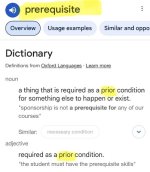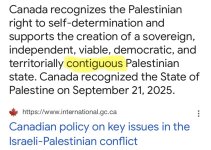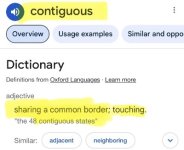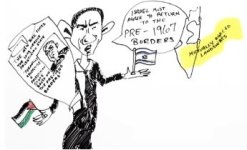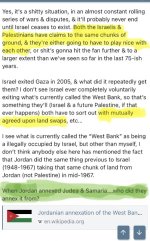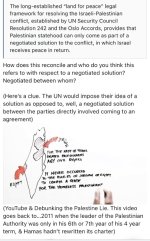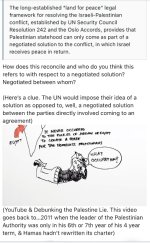What is it?
AI Overview
The "New York Declaration" refers to the New York Declaration on the Peaceful Settlement of the Question of Palestine and the Implementation of the Two-State Solution, adopted on July 29, 2025, at a United Nations High-Level International Conference in New York.
Co-chaired by France and Saudi Arabia, with working groups led by Brazil, Canada, Egypt, Indonesia, Ireland, Italy, Japan, Jordan, Mexico, Norway, Qatar, Senegal, Spain, Türkiye, the United Kingdom, the European Union, and the League of Arab States, it emerged amid escalating tensions in the Middle East following the October 7, 2023, Hamas attacks and the ensuing Gaza conflict.
The declaration outlines a roadmap for ending the Israeli-Palestinian conflict through a two-state solution, emphasizing immediate ceasefires, humanitarian aid, and long-term peace mechanisms.
On September 12, 2025, the UN General Assembly endorsed the declaration via Resolution A/80/L.1/Rev.1, with 142 votes in favor, 10 against (including Israel and the United States), and 12 abstentions.
This endorsement marks a significant multilateral push for Palestinian statehood but has faced criticism from Israel and the U.S. as a "publicity stunt" that undermines direct negotiations and benefits Hamas.
Key Commitments and Provisions
The 42-paragraph declaration, supported by an annex from eight working groups, addresses immediate crises and structural reforms.
Core elements include:
Immediate Humanitarian and Security Measures:
Calls for an immediate and unconditional ceasefire in Gaza, the release of all hostages held by Hamas, and the end to Israeli military operations.
Demands unrestricted humanitarian access to Gaza, including the lifting of the blockade, and condemns settler violence in the West Bank.
Urges protection of civilians, journalists, and aid workers, with accountability for violations of international humanitarian law.
Political and Governance Reforms:
Welcomes Palestinian President Mahmoud Abbas's pledge for democratic elections across the Occupied Palestinian Territory (including East Jerusalem) within one year, under international oversight, adhering to the PLO platform, UN resolutions, and the principle of "One State, One Government, One Law, and One Gun."
Supports Palestinian unity and the establishment of a single, reformed Palestinian Authority with inclusive governance.
Economic and Access Reforms:
Demands removal of movement and access restrictions, release of withheld Palestinian tax revenues, and revision of the 1994 Paris Protocol on Economic Relations.
Advocates for Palestinian integration into the global financial system, including sustainable banking relations and ownership over taxation.
Two-State Solution Framework:
Reaffirms UN resolutions (e.g., 242, 338) for a sovereign Palestinian state on 1967 borders with East Jerusalem as its capital, alongside Israel's security.
Commits to halting settlement expansion, addressing Jerusalem's status, and ensuring refugee rights (including references to the "right of return," which Israel views as existential threat).
Outlines a timeline for negotiations, with international guarantees for implementation.
The declaration positions itself as an "actionable framework" to revive stalled peace processes, building on prior initiatives like the Oslo Accords and Arab Peace Initiative.
Reactions and Implications
Supporters: Proponents, including France and Arab states, hail it as a "bold, comprehensive" step toward justice and stability, filling gaps in international responsibility.
Critics:
Israel called it "theatre" and a misuse of the UN, arguing it ignores Hamas's role and weakens direct talks. The U.S. echoed this, labeling it a "gift to Hamas" that prolongs the war and includes unacceptable provisions like refugee returns.
Broader Context:
Adopted just weeks before the current date (September 23, 2025), the declaration's conference resumes in late September, with ongoing debates on enforcement amid continued violence in Gaza and the West Bank.
This document represents a rare consensus among diverse stakeholders but its success hinges on implementation amid geopolitical divides. For the full text, see the UN's official document A/CONF.243/2025/1.
AI Overview
The "New York Declaration" refers to the New York Declaration on the Peaceful Settlement of the Question of Palestine and the Implementation of the Two-State Solution, adopted on July 29, 2025, at a United Nations High-Level International Conference in New York.
Co-chaired by France and Saudi Arabia, with working groups led by Brazil, Canada, Egypt, Indonesia, Ireland, Italy, Japan, Jordan, Mexico, Norway, Qatar, Senegal, Spain, Türkiye, the United Kingdom, the European Union, and the League of Arab States, it emerged amid escalating tensions in the Middle East following the October 7, 2023, Hamas attacks and the ensuing Gaza conflict.
The declaration outlines a roadmap for ending the Israeli-Palestinian conflict through a two-state solution, emphasizing immediate ceasefires, humanitarian aid, and long-term peace mechanisms.
On September 12, 2025, the UN General Assembly endorsed the declaration via Resolution A/80/L.1/Rev.1, with 142 votes in favor, 10 against (including Israel and the United States), and 12 abstentions.
This endorsement marks a significant multilateral push for Palestinian statehood but has faced criticism from Israel and the U.S. as a "publicity stunt" that undermines direct negotiations and benefits Hamas.
Key Commitments and Provisions
The 42-paragraph declaration, supported by an annex from eight working groups, addresses immediate crises and structural reforms.
Core elements include:
Immediate Humanitarian and Security Measures:
Calls for an immediate and unconditional ceasefire in Gaza, the release of all hostages held by Hamas, and the end to Israeli military operations.
Demands unrestricted humanitarian access to Gaza, including the lifting of the blockade, and condemns settler violence in the West Bank.
Urges protection of civilians, journalists, and aid workers, with accountability for violations of international humanitarian law.
Political and Governance Reforms:
Welcomes Palestinian President Mahmoud Abbas's pledge for democratic elections across the Occupied Palestinian Territory (including East Jerusalem) within one year, under international oversight, adhering to the PLO platform, UN resolutions, and the principle of "One State, One Government, One Law, and One Gun."
Supports Palestinian unity and the establishment of a single, reformed Palestinian Authority with inclusive governance.
Economic and Access Reforms:
Demands removal of movement and access restrictions, release of withheld Palestinian tax revenues, and revision of the 1994 Paris Protocol on Economic Relations.
Advocates for Palestinian integration into the global financial system, including sustainable banking relations and ownership over taxation.
Two-State Solution Framework:
Reaffirms UN resolutions (e.g., 242, 338) for a sovereign Palestinian state on 1967 borders with East Jerusalem as its capital, alongside Israel's security.
Commits to halting settlement expansion, addressing Jerusalem's status, and ensuring refugee rights (including references to the "right of return," which Israel views as existential threat).
Outlines a timeline for negotiations, with international guarantees for implementation.
The declaration positions itself as an "actionable framework" to revive stalled peace processes, building on prior initiatives like the Oslo Accords and Arab Peace Initiative.
Reactions and Implications
Supporters: Proponents, including France and Arab states, hail it as a "bold, comprehensive" step toward justice and stability, filling gaps in international responsibility.
Critics:
Israel called it "theatre" and a misuse of the UN, arguing it ignores Hamas's role and weakens direct talks. The U.S. echoed this, labeling it a "gift to Hamas" that prolongs the war and includes unacceptable provisions like refugee returns.
Broader Context:
Adopted just weeks before the current date (September 23, 2025), the declaration's conference resumes in late September, with ongoing debates on enforcement amid continued violence in Gaza and the West Bank.
This document represents a rare consensus among diverse stakeholders but its success hinges on implementation amid geopolitical divides. For the full text, see the UN's official document A/CONF.243/2025/1.
Last edited:
